
This is not war, this is something else...the voice of the dead; tossed out by the sea on dry shore, telling us stories about people who have died unjustly in war ... These stories chaotically accumulate in our bodies and minds"..
This is a small fragment from the 40-minute monoplay "HA" staged by the independent theater company "Haraki", in which the naked body of a young woman and the her psychic world more sensitive than nakedness (actress Anano Makharadze, text Mariam Megvinite) speak more of sober doom than of survival.
However, you soon realize that exactly this exclamation - "HA" is the strongest and most determined gesture, because the one who fights to the end, the one who pulls himself out of the bottom, is the one who survives and it means that life continues. In the program of the Georgian Showcase the audience will see two more works of "Haraki" "Pathetic Monologues" and “Berserks, Home" – the plays that add more attractiveness to the artistic or political protest and healthy self-irony of the younger generation.
Last year was not in vain for company "Haraki" - director Giorgi Jamburia's play "Berserks I: Mission" was awarded with the "Tavisupali" independent theater award. Such encouregement became an incentive for their next theatrical "madness" - it is enough to see the "Pathetic Monologues" to be sure of this.
Despite the three hours, you probably won't get bored even for five minutes, so precise is the artistic irony of the actors towards the forms and aesthetics of time-worn theater. However, no less important is the ruthless self-irony that the actors use to portray the confrontation between the "old" and "new" theaters.
In addition to survival the main problem for independent theater groups and companies, that have grown recently, is artistic self-sufficiency. It is enough to see and understand, for example, Martin McDonagh's famous black comedy "Linane's Beauty Queen" staged by David Tarba in the "City Theater". However, the play also has a dramatic twist. Keti Tskhakaya (Maggie Folani) and Ani Imnadze (Maureen Folani) are undoubtedly artists equipped with rich and dramatic irony, who correct the already faded theatrical myths with a kind of "physiological realism". So much so that in the play you will smell the smell of freshly cooked porridge and urine almost at the same time.
Another kind of madness is considered by David Tharba in another play "Switzerland", which he staged in Athoneli Theatre based on the play of the Australian writer, playwright and screenwriter Joanna Murray-Smith.
By the way, "Theatre on Athoneli" is that independent space, where the process of domestication and assimilation of modern Western playwrights onto Georgian Theatre scene has been going on for a long time.
The director added black irony and the writer's favorite jazz improvisations to the "skeletons" hidden in the closet of the American writer, the "queen of thrillers" - Patricia Highsmith (more precisely, the knives hidden in the closet according to the play).
Nino Burduli plays the writer suffering from lung cancer, who is locked in her house in the Swiss Alps, with impressive irony and the journalist from the New York publishing house is played by the young and already noticed in many plays Zuka Papuashvili.
Exacty there, in the theater on Athoneli you can see another outstanding performance. Taki Mumladze, a young actor already trained as a star, and Ia Sukhitashvili, a real star of the Rustaveli Theater, jointly created the text and the play "Nino, My Aphrodite".
This is an unexpected but still well-prepared coup of modern Georgian dramaturgy and the same time new, fancy and multi-meaning. The play "Nino, My Aphrodite" is probably closer to the atmosphere of the 1980s film "Female Identification" by Michelangelo Antonioni, saturated with a saucy sexual context, than to the examination-clarification of gender norms emphasized in the play.
And when we mention "women's identification", we should also mention Rainer Werner Fassbinder, whose famous play "The Bitter Tears of Petra von Kant" (Hana Shigula played the main role in the film shot in the early 70s) was staged by Davit Mghebrishvili in the "New Theatre” . I would suggest, it is better for theatergoers to see the duet of Buba Gogorishvili and Nanka Kalatozishvili at least during the days of the festival, because the Georgian Parliament has already adopted the bill "On Protection of Family Values" and if it is approved, morally "stable" citizens will not allow such a thing on the stage.
So what even the themes of loneliness, obedience, empathy-insensitivity and sexual freedom are much more important in the play.
In just 6-7 months after the establishment of the new independent theater space “Theatre Studio 42” the director Levan Tsuladze managed to stage several plays. Shakespeare, Moliere, Strindberg and Harwood at first glance, the building with its classical amfilades and arches (much like the theater from which he already came) fits better than the territory of the former Coca-Cola factory.
However, with his new performances Levan Tsuladze clearly changed the vector of classical plays and replaced them with modern, current, political and social subtexts.
For example, in Shakespeare's Othello, the theme of the destroyed friendship and political careerism of Othello and Iago, who had come out of the war, sounded in a completely new way.
"Don Juan" (Paata Papuashvili plays this role, Nika Kuchava from Sganareli) the director "translated" from a love adventure into the feelings of a person in an existential crisis.
And the "Conductor" based on Harwood's famous play (the story of the trial of Wilhelm Furtwängler, the chief conductor of the Berlin Philharmonic) served as an example of the permanent antinomy of the artist and the politician.
As for the play "Freken Julie", which is an outstanding manifesto of 20th century dramaturgy, Levan Tsuladze brought the action to a modern bakery and hi-tech environment. Julie (Anka Vasadze) listens to electronic music, and Zhan (Paata Papuashvili) looks like a dandy and is not a victim of social inequalities at all. He's just waiting for the moment to destroy Freken Julies' pride.
The director offers us a new and dramatic understanding of the history of Georgia in the play "1921-1924", which presents three years of the independence of the First Republic of Georgia in two acts. In fact, it is a story how we lost independence , the story with dramatism and at the same time poetic narration, which is a good example for the younger generation, how to protect the sovereignty of the country today.
Lovers of non-verbal and physical theater can delve into Ioseb Bakuradze's "Woyzeck" (based on Büchner's play) in the "Movement Theater".
In the "New Theatre", Kote Purtseladze's neoclassical choreography of "Medea" should be viewed a little lightly (against the background of Cherubin and Mozart), and in the approximately one-hour inclusive choreographic performance - "Contact Zone", which consists of three novellas (Valeria Khripachi, Veronika Tikhonova, Natia Chikvaidze) of the play To properly assess the participants' abilities.
If someone is said to be the popularizer of Luigi Pirandello's plays in Georgia, it is first of all the director Giorgi Margvelashvili. Years ago, "Six characters in search of an author" staged in the Tumanishvili theater, today it is part of theatrical mythology and it is not easy at all in the theater that bears Tumanishvili's name.
This time, Giorgi Margvelshvili chose a relatively unknown and early play by Pirandello ("It is so, if it seems so to you"), when the language of the "Pirandello Theater" did not yet exist and the playwright, like Chekhov's Konstantin Treplev, was looking for new forms...
The essential point is that with this performance the director tries to preserve the forms of play, illusion, feeling that were organic to Tumanishvili's theater and which today contains museum and nostalgic notes.
Data Tavadze will complete the "landscape" of Georgia, the country at the crossroads of Asia and Europe, war and peace, with the performance "Hunger". After a five-year pause, Data Tavadze returns to the Royal District Theater with newly embroidered metaphors, a multi-layered text that is sometimes extreme, sometimes incomprehensible and untouched; Often as direct as advertising and sometimes lonely.
Who are these people with numbers on their backs? These four women and three men... maybe we're attending an underground ballroom dance competition? Maybe a secret sect is gathering or call centers are teaching young people how to elegantly seduce pensioners?
"Cruelty is as cheap as charity" - announces the inscription on the screen and for about two and a half hours we have to endure "cheap" cruelty in this glittering, depressing, predatory, luminous and impossible environment, because in the background of so many advertisements for food and drink, we are really very hungry and really we get very tired.
Or maybe cheap cruelty is more than war, peace and hunger combined?!
Davit Bukhrikidze

